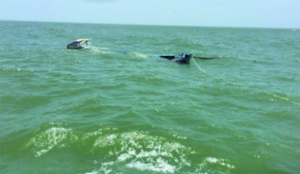Law enforcement authorities in Guyana and Suriname are busy trying to get to the bottom of the recent heinous piracy attacks, so as to ensure that the families of the victims receive the justice they deserve. Currently, security officials in Suriname have a total of 15 persons in custody, among whom are two alleged suspects who were identified by survivors as two of the sea bandits. Investigators believe that they were among a group of men who attacked the fishermen in Surinamese waters on April 27 last, during which 20 crew members were chopped and thrown overboard. Thus far, there have been five survivors and three bodies recovered, while about a dozen fishermen are still missing.

As the investigations continue, though, there is now an interesting twist which is being unfolded; that is: investigators believe that the basis for this act, which the Opposition Leader described as an act of terror, had to do with some form of revenge for one of the persons in custody, whose brother was allegedly gun down in a drive-by shooting some time ago in Suriname.
It was also confirmed that the second attack, just days later, which saw a boat captain killed and his crew missing, is also believed to be linked to the first incident.
Whatever might be the reason for these gruesome attacks, it is incumbent on the authorities in Guyana to revise the current systems in place to address piracy. There is a dire need to restore some sense of comfort to fisher folks, who ply their trade to support themselves and families.
Over the past couple of years, Guyanese fishermen have faced several tragedies while at sea. Several of them have endured brazen attacks by gangs of criminals with fast boats and assault rifles. In addition to being robbed of their valuable possessions, quite a few of them have been killed by their captors. What is even more worrying is that some of the persons carrying out these crimes are themselves fishermen.
Certainly, piracy has had, and is having, a very negative impact on the fisheries sector in Guyana. The fear alone for fisher folks of being attacked at sea is enough reason to prevent persons from getting involved in the field. The economic reality is that the fisheries sector employs over 16,000 fishermen and fish farmers, and a further 6000 in processing and marketing. Thousands more depend directly or indirectly from fishing-related occupations such as boat building, accessories supply, and maintenance services etc.
Even though the then PPP government had toughened the anti-piracy law and had taken a number of steps to assist victims of piracy, enforcement and patrol continue to pose a challenge to the authorities. To begin with, the marine Police seem incapable of dealing with the problem. There is need for sufficient vessels and skilled personnel to conduct maritime patrols along the coastland and in the estuaries of the numerous creeks and rivers, especially in hotspots such as Berbice areas, where piracy seems to be more prevalent.
There is also need for more coordination among public and private agencies, to exercise efficient control over the country’s ports, harbours and coastlines. The Coast Guards should intensify their patrols, especially during certain periods of the year, when there is an increase in piracy. Also the GPF, Customs & Trade Administration, Fisheries Department, Shipping Association, Transport & Harbours Department, and the Maritime Administration Department (MARAD) need to be brought together to plan for the long-term safety of persons legitimately using our rivers and coast, and for the security of commercial and other activities.
Even more importantly, based on what occurred in the most recent incidents, there is clearly a need for closer collaboration with neighbouring countries, especially as it relates to establishing effective warning systems and information sharing. There is need for an effective communication network to be developed, so that in the event of a piracy attack, that mechanism would lead to more patrols being activated etc. From what we gathered recently, there was a lack of collaboration and effective communication mechanism between Surinamese and Guyanese officials prior to the most recent cases of piracy.
These are measures which could be taken to lessen the frequency of these attacks, thus reducing the risk of losses of equipment; catch; and, more importantly, preventing the loss of lives.
Related posts
-

Lindender Taneila Croal shares her journey as a young entrepreneur
By Utamu Belle At 26 years old, Lindener Taneila Croal has her eyes set on living... -

Poetry is my way of expressing what I’ve been through or what I am going through – Kelwin Gittens
By Lakhram Bhagirat Sometimes finding the right word to ascribe to your feelings of intimacy and... -

This International Women’s Day, Let’s focus on
equity over equality By Marlee Silva for ABC News International Women’s Day was a rather foreign...
